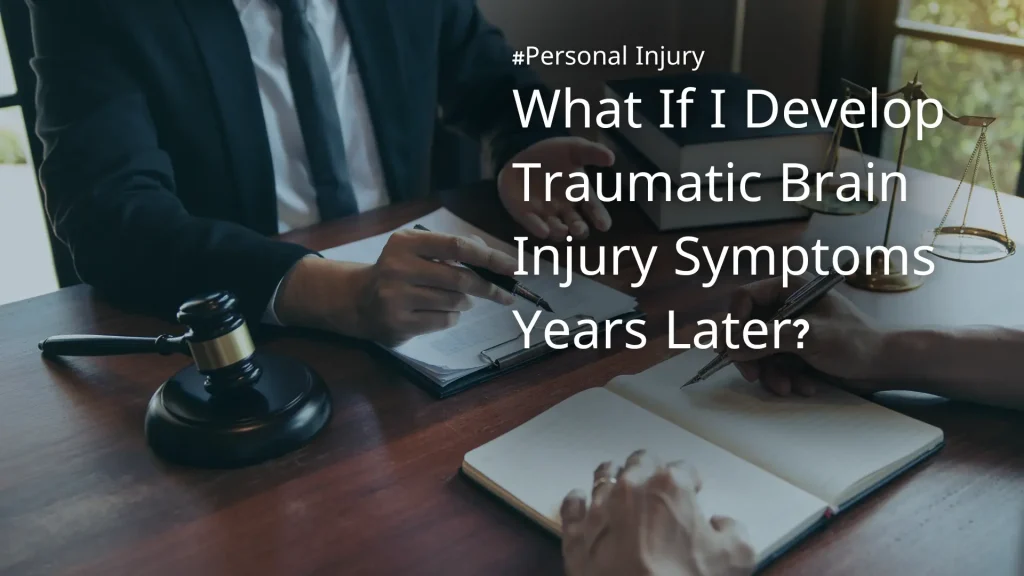Posted on Sunday, September 15th, 2024 at 9:00 am

Traumatic brain injuries (TBI) can have long-term effects, sometimes surfacing years after the initial injury. It’s not uncommon for people in Atlanta to develop traumatic brain injury symptoms years later. These symptoms may include memory loss, headaches, or mood changes. If you develop traumatic brain injury symptoms years after an injury, you might still qualify for compensation. However, time is of the essence, as legal deadlines can limit your ability to file a claim.
The Atlanta brain injury lawyers at Jonathan R. Brockman, P.C. have seen how these devastating accidents can affect victims years later. Keep reading to learn more about what to do if you develop TBI symptoms years after an accident.
What Causes Traumatic Brain Injury Symptoms Years Later?
Despite the extensive research into brain injuries in recent years, doctors still don’t fully understand them. That makes it hard to say precisely what causes these symptoms to appear years later and how often they occur.
For example, one common way that TBI symptoms manifest years later is a condition called Post-Concussion Syndrome (PCS). While most concussion symptoms appear shortly after the head injury, people with PCS may experience symptoms months or years after their initial brain injury. Research into PCS is ongoing, but many doctors believe this condition results from the brain’s inability to fully heal. Several factors may contribute to the likelihood of someone developing PCS, such as:
- The severity of the initial brain injury
- Individual differences in people’s health and recovery
- A history of prior concussions or other brain injuries.
Common Signs of a TBI Years Later
While individual long-term symptoms of a TBI vary, some common signs to watch for include:
- Memory Problems: Difficulty remembering recent events or recalling information that should be familiar.
- Headaches: Persistent or recurring headaches that develop long after the initial injury.
- Dizziness or Balance Issues: Feeling unsteady, dizzy, or having trouble maintaining balance.
- Mood Changes: Sudden shifts in mood, irritability, or depression that weren’t present before.
- Fatigue: Unexplained tiredness or lack of energy, even after adequate rest.
- Difficulty Concentrating: Trouble focusing on tasks, easily distracted, or feeling mentally “foggy.”
- Sleep Disturbances: Difficulty falling asleep, staying asleep, or feeling rested after sleep.
- Sensitivity to Light or Noise: Increased sensitivity to bright lights or loud sounds.
- Cognitive Decline: Slower thinking, difficulty processing information, or problems with problem-solving skills.
- Personality Changes: Noticeable changes in behavior, temperament, or social interactions.
If you notice any of these signs or symptoms, talk to a doctor immediately.
What To Do if You Have Long-Term TBI Symptoms

If you have long-term TBI symptoms, it’s crucial to take action to protect your health and legal rights. Here’s what to do:
- Seek Medical Attention: Consult a doctor who specializes in brain injuries. They can diagnose your condition and recommend treatment options to manage your symptoms.
- Document Your Symptoms: Keep a detailed record of your symptoms, when they occur, and how they affect your daily life. This documentation is essential for your medical care and any legal claims.
- Follow Medical Advice: Adhere to your doctor’s treatment plan, including attending follow-up appointments and taking prescribed medications. Consistent treatment is essential for managing TBI symptoms.
- Consult a Lawyer: Speak with a personal injury lawyer to understand your rights and explore your options for seeking compensation. They can guide you through the legal process and help protect your interests.
- Act Quickly: Don’t wait to seek legal advice, as there may be impending deadlines for filing a claim. Acting promptly can help you recover the compensation you need.
Deadline to File a Traumatic Brain Injury Lawsuit in Georgia
The Georgia Code says you usually have two years from when an accident occurs to file a personal injury lawsuit. You might have more time in some cases, but don’t count on it. If you miss the deadline to file a lawsuit, you lose your right to compensation for your injuries. Talk to a lawyer immediately to protect your rights.
How Our Atlanta Brain Injury Lawyers Can Help You
The Atlanta personal injury lawyers at Jonathan R. Brockman, P.C. understand the challenges you’re facing and know how to build a strong case on your behalf. Our attorneys can thoroughly investigate your case, gather evidence, and consult medical experts to connect your symptoms to a prior accident. They have the legal knowledge and proven track record to handle your case. We’ll also handle all communication with insurance companies and negotiate on your behalf for a fair settlement.
You don’t have to face this challenge alone; our law firm is here to help. Call 770-205-8887 or complete our contact form to get a free consultation today. Ask us anything related to your case.
Related Posts:
How to Deal with Brain Stem Injuries
Why Posting on Social Media After an Accident Can Hurt Your Case
